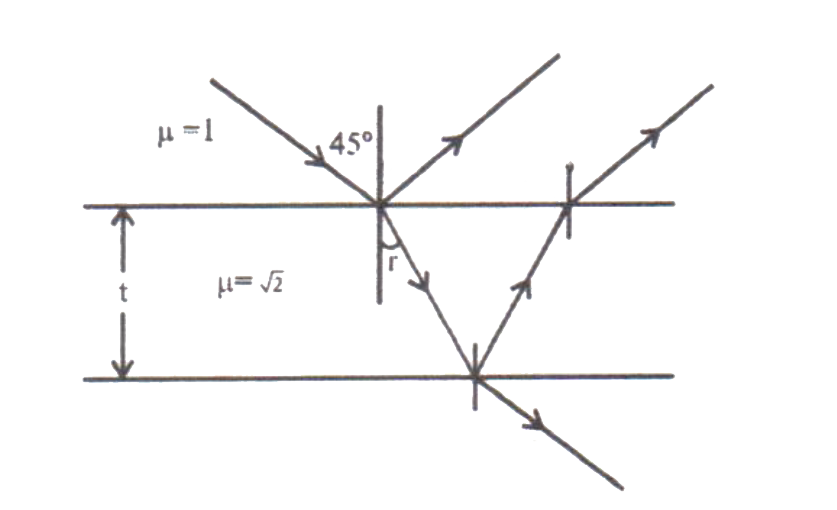Our disscusssion of the techniques for determining cosntructive and destructive by reflection from a thin film in air has been confused to rays striking the film a nearly the normal incidence.Assume that a ray is incident at an angle of 45∘ (relative to the normal ) on a film with an index of refraction of √2.Calculate the minimum thickness fro constructive interference for light of wavelength 600nm.
Step by step video, text & image solution for Our disscusssion of the techniques for determining cosntructive and destructive by reflection from a thin film in air has been confused to rays striking the film a nearly the normal incidence.Assume that a ray is incident at an angle of 45^(@) (relative to the normal ) on a film with an index of refraction of sqrt(2).Calculate the minimum thickness fro constructive interference for light of wavelength 600nm. by Physics experts to help you in doubts & scoring excellent marks in Class 12 exams.
Topper's Solved these Questions
- BOOK - PHYSICS GALAXY - ASHISH ARORACHAPTER - WAVE OPTICSEXERCISE - Practice Exercise 6.21videos
WAVE OPTICS
- BOOK - PHYSICS GALAXY - ASHISH ARORACHAPTER - WAVE OPTICSEXERCISE - Practice Exercise 6.31videos
WAVE OPTICS
- BOOK - PHYSICS GALAXY - ASHISH ARORACHAPTER - WAVE OPTICSEXERCISE - Practice Exercise 6.11videos
WAVE OPTICS
- BOOK - PHYSICS GALAXY - ASHISH ARORACHAPTER - THERMODYNAMICS LAWS & SPECIFIC HEATS OF GASES EXERCISE - Practice Exercise 3.411videos
THERMODYNAMICS LAWS & SPECIFIC HEATS OF GASES
- BOOK - PHYSICS GALAXY - ASHISH ARORACHAPTER - WAVES EXERCISE - Unsolved Numerical Problems for Preparation of NSE, INPhO & IPhO135videos
WAVES
Similar Questions
Our disscusssion of the techniques for determining cosntructive and destructive by reflection from a thin film in air has been confused to rays striking the film a nearly the normal incidence.Assume that a ray is incident at an angle of 45∘ (relative to the normal ) on a film with an index of refraction of √2.Calculate the minimum thickness fro constructive interference for issodium light of wavelength 600nm.
View SolutionWhite light is incident normally on a thin glass plate of refractive index 1.5. Calculate the minimum thickness of the film for which the wavelength 4200Å is absent for the reflected light.
View Solution
Knowledge Check
- Question 1 - Select One
A ray of light is incident at an angle of 45∘ (ralative to the normal) on a thin film of a liquid with an index of refraction of √2. Assuming that the medium of both sides of the film is air, find the minimum thickness of the film required for constructive interference in the reflected light for sodium light of wavelenght 600 nm.
 A122 nmB212 nmC173 nmD320 nm
A122 nmB212 nmC173 nmD320 nm - Question 2 - Select One
A ray of light is incident at an angle of 45∘ on one face of a rectangular glass slab of thickness 10cm and refractive index 1.5. Calculate the lateral shift produced.
A0.33 mB0.45 cmC0.033 mD0.045 m - Question 3 - Select One
A thin film of thickness t and index of refractive 1.33 coats a glass with index of refraction 1.50.What is the least thickness t that will strong refelct light with wavelength 600nmincident normally?
A225nmB300nmC400nmD450nm
When light rays are incident on a prism at an angle of 45∘, the minimum deviation is obtained. If refractive index of material of prism is √2, the angle of prism will be
View SolutionWhen light rays are incident on a prism at an angle of 45∘, the minimum deviation is obtained. If refractive index of the material of prism is √2, then the angle of prism will be
View SolutionBlue light of wavelength 480 nm is most strongly reflected off a thin film of oil on a glass slab when viewed near normal incidence. Assuming that the index of refraction of the oil is 1.2 and that of the glass is 1.6, what is the minimum thickness of the oil film (other then zero)?
View SolutionThe refractive index of water relative to air is 5/3. A ray of light passing from water into air is incident at the interface at an angle of 32∘ with the normal. What angle does the refreacted ray make with the normal?
View SolutionIf wavelength 4500Å and 6000Å are found to be missing in the reflected spectrum in thin air film interference, the thickness of the film for normal incidence is nearly
View Solution
